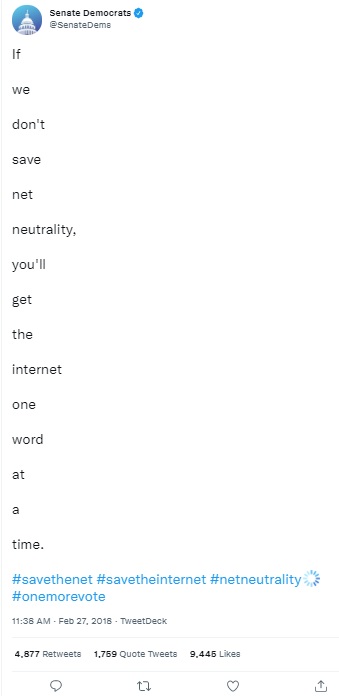If you’re a policy wonk, you’ll enjoy this history of how government regulation has hindered the development of telecommunications technology.
I want to focus on the part of the video, beginning about 30:00, which discusses “net neutrality.” The interview with Professor Hazlett took place in 2017, at a time when there was lots of fighting over this issue.
The pro-regulation crowd claimed that net neutrality was needed to protect consumers from slow and expensive service. And they made all sorts of ridiculous claims about the Trump Administration’s plans to get rid of the Obama-era regulation.
At the time, this tweet from the Democratic members of the U.S. Senate got a lot of attention.
So what actually happened after net neutrality was repealed?
I suppose the first question to answer is:
Did..
…the…
…Internet…
…slow…
…to…
…a…
…crawl?
Not exactly. Robby Soave gives us the details in a column for Reason. He starts with some background information.
Exactly four years ago, the Federal Communications Commission (FCC) repealed the internet regulation known as net neutrality, which had forced internet service providers (ISPs) to treat all content identically in terms of download and streaming speeds, for instance.
Since the popular policy had come into existence during the Obama administration, and was gutted during President Donald Trump’s term, its demise was treated as the end of the internet as we know it by panic-stricken #resistance liberals. …The term net neutrality was coined by law professor Tim Wu in 2006; his big idea was that the government needed the power to restrict ISPs’ ability to offer different levels of service to different customers. …Wu cautioned that without rules requiring internet service providers to treat all traffic and content equally, the internet as we had come to know it would cease to exist.”
And here are the results.
Today, the internet is still here, and still functioning properly. Expectations that ISPs would practice widespread and improper discrimination did not pan out. On the contrary, the internet is better and faster for basically everybody than it was when net neutrality ended—in fact, it’s better and faster than at any point in the past. …Foes of net neutrality were clearly correct that the internet didn’t need the government to save it, and absent federal direction and regulation, everything is fine.
The moral of the story is that we experienced a major test of regulation vs. deregulation. And we’ve learned that the advocates of red tape were wildly wrong and the supporters of free enterprise were exactly right.
That’s a lesson we can apply to all sorts of other issues involving government intervention (housing subsidies, financial markets, fisheries, organ transplants, labor markets, etc, etc).

No comments:
Post a Comment